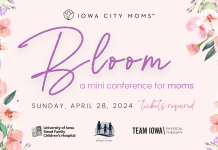Are you unsure if your child is understanding what you say to them?
Do you worry about how their language skills are developing?
We are thrilled to have Sarah Sitzmann sharing some expertise on the blog today! Sarah is a Speech-Language Pathologist at Enrichment Therapy and Learning Center in North Liberty, and she’s going to answer a few common questions about early language and what we can do as parents to help our little ones.
Q: How early should my child be talking?
A: This is by far the most common question I hear from both new and experienced parents. New parents want to know if their child’s communication skills are “normal,” and experienced parents almost always compare their second or third child to their early developing first child! So… what’s the answer?! Well, there is no EXACT answer. Research shows that first words such as “mama”, “dada,” or “mo” typically occur around 12 months of age. However, there is a large developmental range. Some children say their first word as early as 10 months, and others as late as 16 months.
Just as some children develop motor skills earlier than others, there is no cookie-cutter answer. However, by 12-18 months your child should be using a variety of single words and seeking you out to request a desired item or to interact with you.
Q: What should my child’s communication look like at what ages?
A: Check out the below “checklists” and download the PDF version to your own computer for easy-print access. In these checklists I have outlined some key language skills that children should be demonstrating by each age. Please keep in mind this list is not exhaustive, and if your child is not demonstrating all of the skills on time it does not mean that there is a delay or problem! However, if you feel there is a language concern, consider an evaluation from a speech language pathologist. At Enrichment Therapy and Learning Center we are here to help–early intervention is key!
Checklists:
One-year-old checklist
Two-year-old checklist
Three-year-old checklist
Four-year-old checklist
Q: My child is 16 months old and they are not talking. What should I do?
A: Don’t fret, kids develop language between a large range. Just like kids develop motor skills and begin walking at different times, they begin speaking at different times as well. I often recommend that parents of children 15-16 months see a speech-language pathologist if the child is not producing any true words. A true word is a word or word approximation that is consistently used for the same thing.
Typically, when I see children this young, I make some communication suggestions for the parents to practice at home and then have these children return for a full language evaluation at 18-20 months if they are not communicating verbally at this time. Usually, parents report that they are able to make huge progress with their child.
Q: What are your communication suggestions?
A: Here are a few suggestions that I recommend in that scenario:
- Withhold very familiar objects/toys until your child labels them to request. This will encourage your child to initiate verbalization and to use words more often than gestures. Be warned: they will likely scream and cry. Just wait it out. Another trick is to put the toy they want up on a high shelf and wait until they use a vocalization (e.g., “mo” for “more”).
- Use exclamatory words! For example, BOOM, WOW, UH-OH, and OOPS.
- Utilize a routine to encourage spontaneous vocalization. My favorite routine to teach parents can be utilized with bubbles or any type of ball toy. The parent says, “Ready Set..” and waits. Eventually the child will understand that they are to say “GO!” Repeat this routine over and over until he child says “go” 100% of the time.
Q: I don’t think my child understands what I am saying. Are they being stubborn or do they not understand me?
A: Break down the steps into simple one-part directions. For example, instead of saying, “Go get your shoes and put them on,” start by something more simple, “Go get your shoes.” When your child brings the shoes, give the next instruction, “Put your shoes on.” It is also helpful to utilize eye contact and use gestures when children are still learning language–this helps them start to understand more complex words.
Sometimes children can be stubborn, which makes this difficult. If your child is understanding simple directions, and always understands the directions when it benefits them or they get a reward, then it is likely they are just stubborn. If you find yourself constantly repeating one-step directions, it is possible a language disorder or delay may be present. If you just aren’t sure, I recommend scheduling a language screening with a speech-language pathologist.
Q: What is the best way to talk to my toddler?
A: When children are younger than two years of age, I recommend that parents use speech that is often referred to as “Motherese” or “simple speech.” This type of language is best described as using a sing-song voice when talking to a baby. It involves changing your intonation up and down dramatically when you are talking. This is a good thing! When you are using this “simple speech,” you are actually helping your child identify differences between words. This change in intonation helps a child hear the differences between each word. This simple speech should always be grammatically correct. It is not helpful to a child to say, “baby so tired” because this is not grammatically correct. It is more beneficial to say, “The baby is so tired.”
Once a child can hear the difference between words, “complex” speech can be used to help the child learn the meaning between words. Around two years of age a child begins to learn what words mean. An example of complex speech is, “It is time to brush your teeth and put your pajamas on so you are ready for bed!” Children naturally learn to hear the difference between words and learn the meaning by listening and watching adults when they are young.
When children have a language disorder, learning the difference between words and the meaning of words is disrupted. If you have any concerns about your child’s ability to learn these, please take your child to a speech-language pathologist.
About Enrichment Therapy and Learning Center
Enrichment Therapy and Learning Center offers free screenings for all services: speech, language, writing, math, and dyslexia. They have offices in North Liberty and the Des Moines metro.
E-mail: [email protected]
North Liberty Office: 319-626-2553
Urbandale Office: 515-419-4270
Their friendly and knowledgeable staff are happy to help! Please call in with any questions and tell them ICMB sent you.
This is a sponsored post. ICMB was compensated for sharing this piece. However, we love connecting our readers with people and organizations that are doing good in our community, and we think you will find this information helpful and informative!











